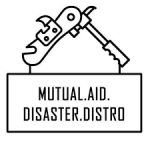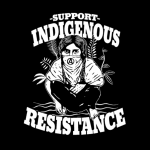Sahar Francis of Addameer

This week, I spoke with Sahar Francis, the Director of Addameer. Addameer is a non-governmental organization, or NGO, based in Ramallah in the West Bank in occupied Palestine that focuses on human rights advocacy, political prisoner support & public education efforts like Know Your Rights trainings. Addameer is one of the projects that is receiving a portion of the profits of the 2019 Certain Days: Political Prisoners Calendar that we’ve you’ve heard of in past episodes. For the purposes of broadcast, we had to cut some portions of this chat for the radio. If you’re listening to the radio version, check out our podcast version for a few more minutes of chat. More instructions below.
For the hour, Sahar tells us about aspects of the Palestinian struggle of the last 70 years against the domination of the Israeli state and a little about the refugee situation of the 10 million Palestinians in the region as they await their Right of Return to their homeland. Addameer (which translates to “Conscience” from Arabic) works to highlight the treatment of Palestinians in the Occupied Territories by the military court system of Israel, in particular the situation of youth as young as 12 years old who face harassment and torture, administrative detention of months and years on end with seemingly no end, and the impunity of the military system’s use against Palestinians, and the unequal treatment of Palestinians and Israeli Jewish Settlers in the Occupied Territories. We also speak of the movement towards widening the death penalty under military law and the difficulty of Palestinian lawyers offering defense in the Israeli military courts who aren’t usually fluent in Hebrew or proficient in Israeli law, as they study Palestinian law in college. Addameer, as a human rights organization, frames it’s work in terms of International Human Rights law as enshrined in the United Nations (UNRWA, The Geneva Convention in hopes of eventual international intervention against the ongoing genocide at the hands of the Israeli government. We even cover the incarceration of Palestinians (in Israel or the Occupied Territories) for publishing critique of the Israeli occupation on social media (1,000’s, including Tareen Tatour in 2015). In a segment comparing Settler-Colonialism in the U.S. & Israel/Palestine, Sahar speaks about two Bedouin villages under threat of demolition by Israel, Khan al-Ahmar in the occupied West Bank as well as Umm al-Hiran in order to clear way for Israeli colonial design.
If you visit our website, thefinalstrawradio.noblogs.org you can find all of our episodes going back to 2010. To never miss an episode, click the “podcasting” link, where you can find instructions on how to subscribe to our podcast using iTunes or whatever music app or program you like, including our soon-to-be resurrected Error451 podcast, an occasional tech security podcast from an anarchist perspective. In the near future we hope to bring you perspectives on encryption from the pEp (or Pretty Easy Protection) Foundation, LEAP (or Leap Encryption Access Project) and more.
Stay tuned next week for an overview of the 2018 Nationwide Prison Strike with an incarcerated organizer named Dee from Jailhouse Lawyers Speak.
Announcements
Phone Zap for Comrade Malik Washington
This didn’t make it into the recording for today, but this Tuesday, November 13th, BRABC with the backing of IWOC is inciting a phone zap in support of Keith “Comrade Malik” Washington to get Malik out of segregation. Malik has been continuously punished and persecuted, including instances of medical endangerment and solitary confinement with out reason given or recourse. He’s also had his property, including legal documents, taken and his communication is greatly stifled at the moment (including legal). Read more by visiting the above links.
Digital Security Self-Defense at Firestorm
If you’re in the Asheville area coming up, on Saturday, November 17th from 4-6pm at Firestorm Books and coffee, Blue Ridge Anarchist Black Cross will be giving a free, interactive presentation on online hygene and security self-defense threat modeling the far-right. But, whether you’re concerned about what info’s online that might fall into the hands of the fash, a stalker or just want to tie up loose ends, a lot of the tools and tips are the same. Bring a laptop, tablet or phone to work on. And a few hours later there’ll be a concert by Nomadic War Machine at the Bottle Shop, an electronic assault by Margaret Killjoy that you’re welcome to swing by.
SF Bay View Newspaper Updates
In an update to our past episode featuring Mary Ratcliff of the SFBayView National Black Newspaper from August, we have good news! Amani Sawari, who we interviewed in July about the Nationwide Prison Strike as an outside spokesperson for Jailhouse Lawyers Speak prisoner organization, will be stepping up to take on the editorial position at that paper and giving Mary and Dr. Willie Ratcliff a long-deserved break. There’s an online fundraiser to help get Amani situated in the Bay Area where you can support the transition and hopefully long next phase for the paper. You can find out more at https://www.patreon.com/sfbayview
Anti-Anti-Semitism Action
In light of the murder of eleven people at the Tree of Life synagogue, Anti-Anti-Semitism Action is asking for your support to take action against anti-Semitic organizers and to defend Jews. We are raising funds which we need to spotlight specific anti-Semitic organizers—especially those who use platforms that cater to the Alt Right such as Gab—to spread their toxic conspiracy theories. Funds will be used to expose and run public campaigns against activists who spread anti-Semitism, as well as those promoters who bring anti-Semitic speakers to their towns.
Remaining monies will be used to provide security and protection for Jewish activists who are targeted by anti-Semites. This includes hiring security for public appearances, and arranging security measures at activists’ residences.
The ADL raises millions of dollars a year to “fight anti-Semitism” but they refuse to do the nuts and bolts work of taking action against anti-Semitic organizers or protecting Jews who are targeted. 100% of your donations will go directly to this.
Donate to this fundraiser here
Support Craggy Prisoner, Dayvon Person
Dayvon Person is a prisoner being accused of inciting a riot on September 24 at the Craggy Correctional Institution, just outside of Asheville, NC, where he was just about to reach minimum security levels. It’s requested that people call officials to press them to hear is appeal of innocecence. He is asking that folks on the outside call with persistence, and ask these persons to hear his appeal for this false accusation.
You can call:
Kenneth E. Lassiter (Director of Prison Facilities):
David Rogers (State Representative):
Ralph Hise (NC Senator representing District 47):
Express your concern through calling or writing the North Carolina Department of Public Safety:
512 North Salisbury Street
Raleigh, NC 27604
. … . ..








